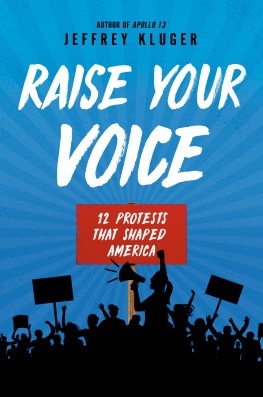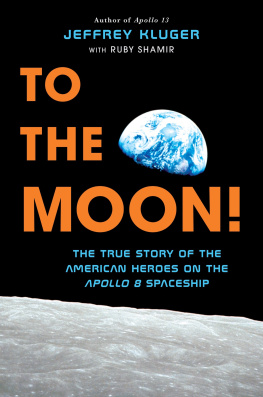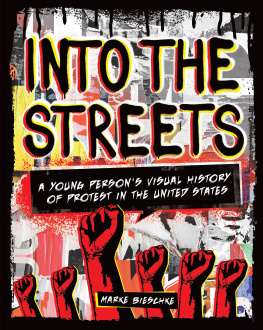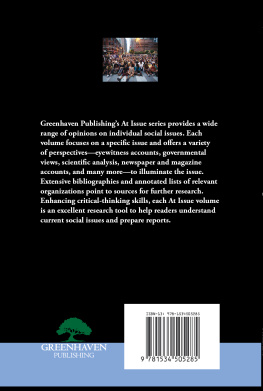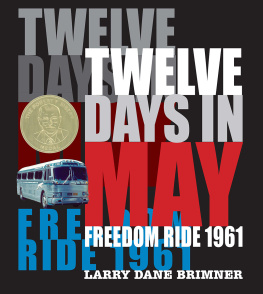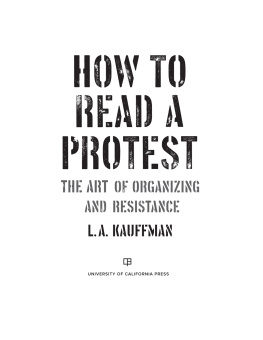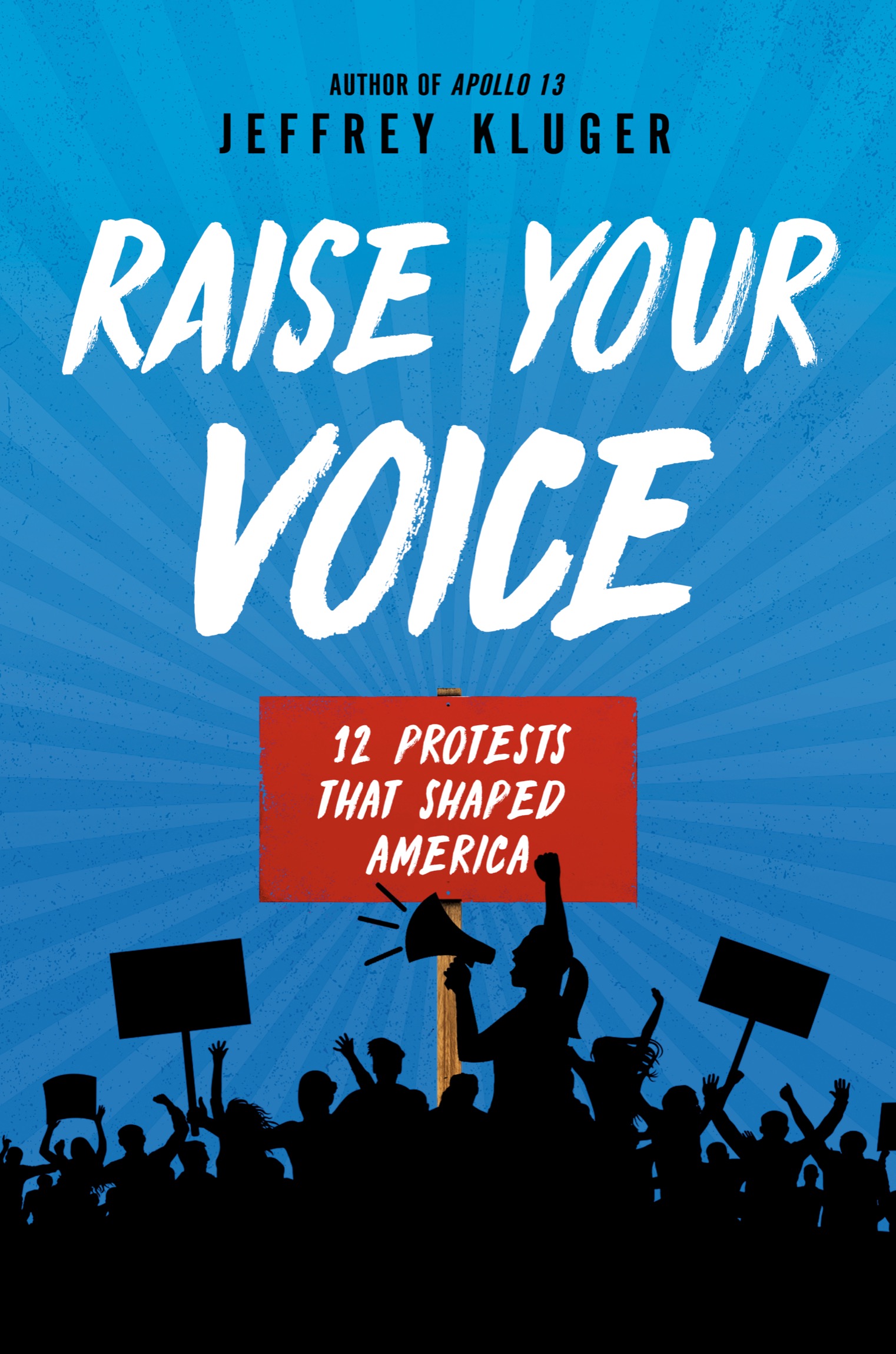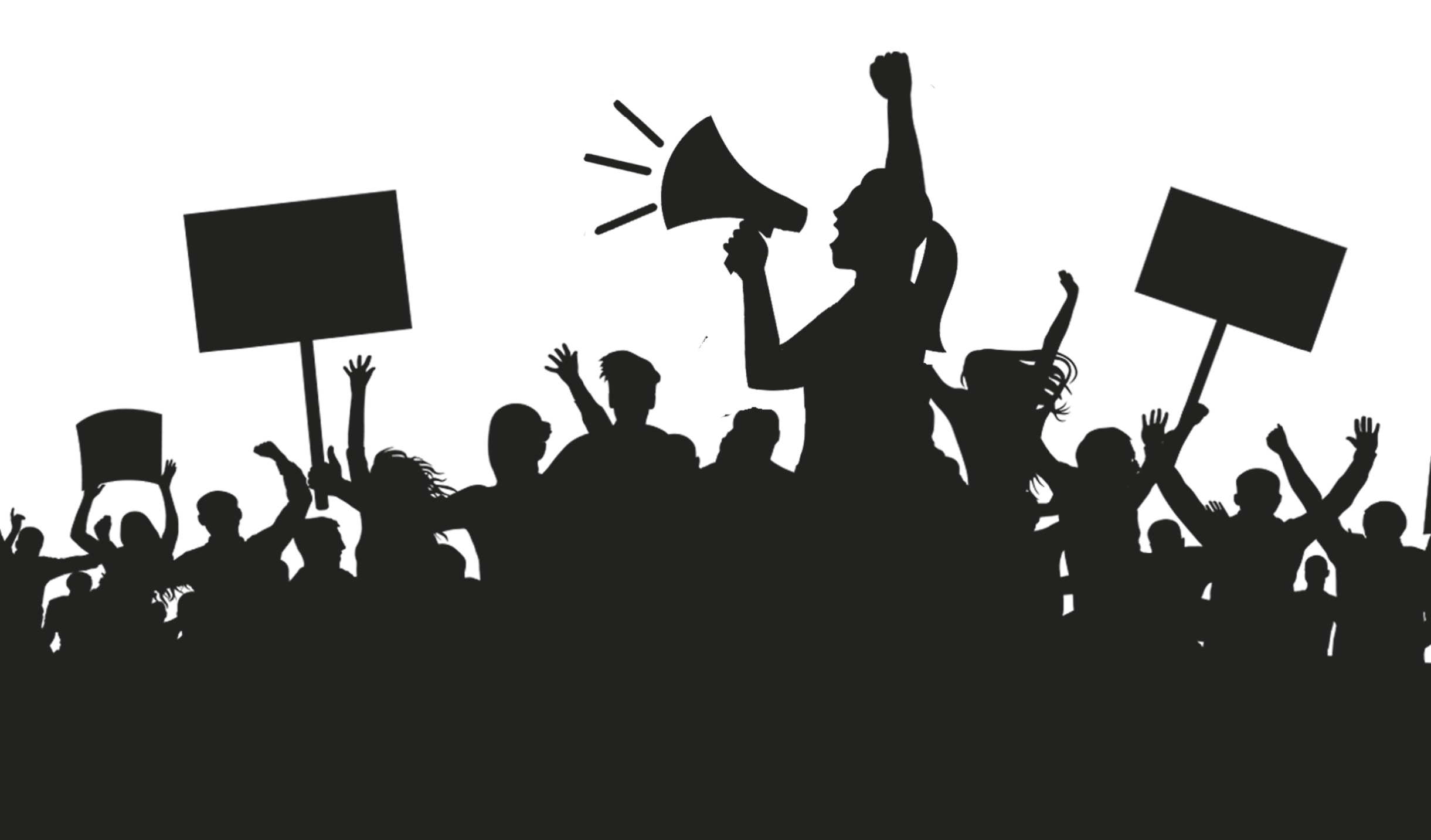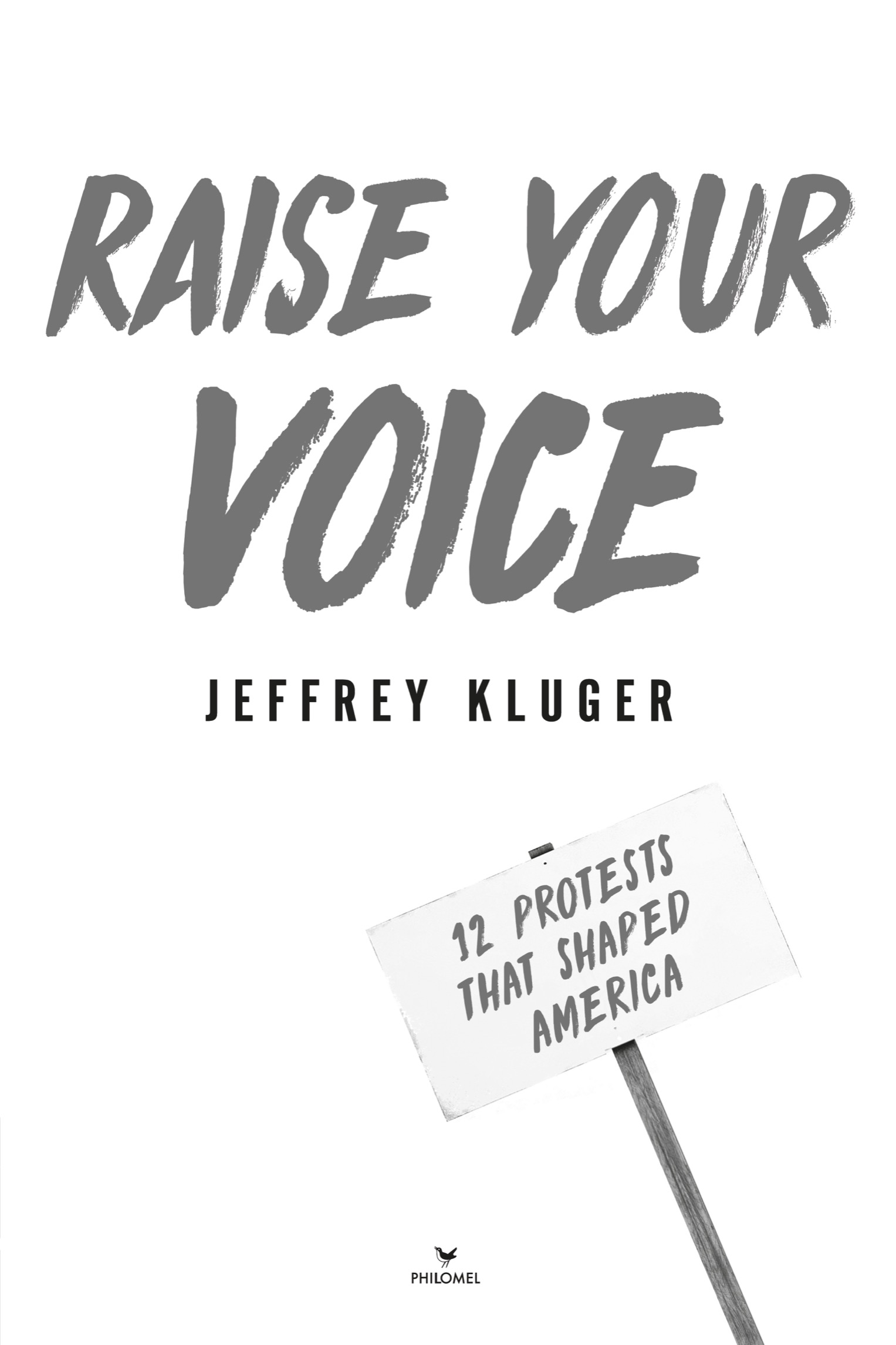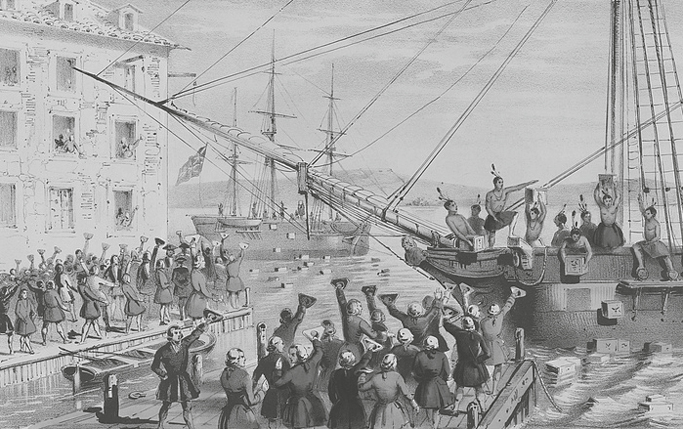Also by Jeffrey Kluger
T O THE M OON !
D ISASTER S TRIKES !
Philomel Books
An imprint of Penguin Random House LLC, New York

First published in the United States of America by Philomel,
an imprint of Penguin Random House LLC, 2020.
Copyright 2020 by Jeffrey Kluger.
Penguin supports copyright. Copyright fuels creativity, encourages diverse voices, promotes free speech, and creates a vibrant culture. Thank you for buying an authorized edition of this book and for complying with copyright laws by not reproducing, scanning, or distributing any part of it in any form without permission. You are supporting writers and allowing Penguin to continue to publish books for every reader.
Philomel Books is a registered trademark of Penguin Random House LLC.
LIBRARY OF CONGRESS CATALOGING-IN-PUBLICATION DATA
Names: Kluger, Jeffrey, author.
Title: Raise your voice : 12 protests that shaped America / Jeffrey Kluger.
Description: New York : Philomel, 2020. | Includes index. | Audience: Ages: 812 |
Audience: Grades: 4-6 | Summary: A recounting of protests throughout American history that have shaped our nationProvided by publisher. Identifiers: LCCN 2019030850 (print) | LCCN 2019030851 (ebook) | ISBN 9780525518303 (hardcover) | ISBN 9780525518310 (epub)
Subjects: LCSH: DemonstrationsUnited StatesHistoryJuvenile literature. | Protest movementsUnited StatesHistoryJuvenile literature. | Political participationUnited StatesHistoryJuvenile literature. | United StatesHistoryJuvenile literature. Classification: LCC HN57 .K565 2020 (print) | LCC HN57 (ebook) | DDC 303.48/40973dc23 LC record available at https://lccn.loc.gov/2019030850
LC ebook record available at https://lccn.loc.gov/2019030851
Visit us online at penguinrandomhouse.com.
Ebook ISBN 9780525518310
Edited by Jill Santopolo.
pid_prh_5.5.0_139291231_c0_r0
TABLE OF CONTENTS
INTRODUCTION
YOU CAUGHT AN awfully lucky break when you were born a person. We all did. Theres a lot for humanity to be proud of, after all. Were the species that mastered art, that mastered science, that understands geometry and biology and astronomy and medicine. We build rockets and send spacecraft to other planets; we design buildings that tower half a mile into the sky; we dig tunnels underground where we accelerate subatomic particles nearly to the speed of light and use them to crack open the secrets of the universe.
We are, too, the species that knows how to love. Other animals surely bond deeply and powerfully to one another. They protect their babies; they guard their herds and flocks and packs. Elephants, dolphins and crows mourn their dead, bury their remains and caress their bones. Yet we are the species that feels and celebrates love in all its dimensions and all its depths. We would give our lives for the life of anotherbecause to live without a loved one sometimes seems not to be alive at all.
And yet, we can be terrible too. We are the species that mechanized war, that commits murder out of rage or greed, that betrays friends or families if it means accumulating wealth. Worst of all, perhaps, we separate ourselves into camps: we divide ourselves by race, by gender, by religion, by nation, by sexual orientation, by politics and class. And it is the more powerful group that often exploits the less powerful.
Men claim rights they deny to women; white people claim privileges they have forbidden to black people and other people of color. Owners of companies cheat their workers; political groups with power exploit those without. Industrialized countries pollute the planet, indifferent to the needs of less industrialized ones. Heterosexual people drive gay people into the shadows. Nations with empires oppress their colonies. Countries with nuclear weapons terrorize the entire world.
We know better; indeed, were hardwired to know better. Scientists who study the mind have looked at which parts of the brain become active when we witness something thats fundamentally unfaira person cheating at a game, a landlord raising a rent so high that an elderly person is tossed into the street, a drug company charging so much for a medicine that sick people cant afford it. The region of the brain that becomes active when we witness such things turns out to be the same region that goes to work when we feel disgust. It is, in some ways, an admirable part of us: we react to the thought of unfairness in the same way we do to the smell of a rotten egg or the sight of spoiled meat.
And yet if were disgusted by unfairness, we dont always act that way. Down through the millennia, strong and dominant groups have again and again worked their will against weaker and subordinate ones. But down through those same ages too, the disadvantaged and the oppressed have risen up. Emperor Caligula was overthrown in ancient Rome. The Jewish slaves in ancient Egypt cast off the pharaohs yoke. The oppressed black people in South Africa took back their rights from the oppressing whites. The imprisoned nations of Eastern Europe wrenched themselves free of the old Soviet Union.
The United States itself was born in an act of rebellion, with the thirteen colonies rearing up against the king of England. Throughout our relatively brief history, that liberation tale has been told again and again, with black people and women and poor people and more recognizing injusticerecoiling from it as a thing turned fouland demanding the freedoms that are their right. Its an act not just of rising up, but of speaking outand, when necessary, crying out.
Americans have raised their voices many such times over the centuries, and no one groups liberation story is greater than any others. The ongoing battles for the right to live where you choose, to love whom you love, to have the job you want and the social freedoms you deserve, to vote for the people who will make the laws and vote against them if you dont like those laws are all a part of our shared history.
And the best part of thatthe part that activates the regions of the brain that light up at the thought of something sweet or just or goodis that when one group becomes freer, so do we all. The twelve stories of civil uprisings that follow are by no means the only ones that have shaped America, but they are among the ones that have shaped us mostand they are ones that teach us lessons still.
Courtesy of the Library of Congress
The Boston Tea Party, as re-created by an artist in 1846.
ONE
The Boston Tea Party
1773
IT WASNT EASY to tell the difference between the bad guys and the good guys if you lived in Boston in 1773. A few of them, of course, were hard to mistake. The British soldiers were certainly bad guysat least the way the colonists saw them. It was the soldiers, after all, who strode about in their military finery and enforced the laws that came from a king who lived across the ocean in a land almost no one in Boston had ever visited. That by itself made it hard to understand why such a man should be able to tell the colonists what to do, but never mind, he did.

